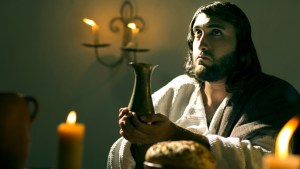Lenten Campaign 2025
This content is free of charge, as are all our articles.
Support us with a donation that is tax-deductible and enable us to continue to reach millions of readers.
It can be tempting at times to think of the Mass as a play, where the priest reenacts the events of the Last Supper.
However, that is not what Jesus intended or what the earliest Christians did after Jesus’ death, resurrection and ascension into Heaven.
“Do this in memory of me”
The Catechism of the Catholic Church is clear that the Mass is not simply a remembering of past events:
The command of Jesus to repeat his actions and words “until he comes” does not only ask us to remember Jesus and what he did. It is directed at the liturgical celebration, by the apostles and their successors, of the memorial of Christ, of his life, of his death, of his Resurrection, and of his intercession in the presence of the Father.
CCC 1341
The Catechism further explains how the earliest Christians would celebrate the Eucharist:
From the beginning the Church has been faithful to the Lord’s command. Of the Church of Jerusalem it is written:
They devoted themselves to the apostles’ teaching and fellowship, to the breaking of bread and the prayers. . . . Day by day, attending the temple together and breaking bread in their homes, they partook of food with glad and generous hearts.
CCC 1342
Re-presentation
Instead of being a reenactment, the Church describes the Mass as a “re-presentation” of the same sacrifice of Jesus on the cross:
The Eucharist is thus a sacrifice because itre-presents (makes present) the sacrifice of the cross, because it is its memorial and because it applies its fruit:[Christ], our Lord and God, was once and for all to offer himself to God the Father by his death on the altar of the cross, to accomplish there an everlasting redemption. But because his priesthood was not to end with his death, at the Last Supper “on the night when he was betrayed,” [he wanted] to leave to his beloved spouse the Church a visible sacrifice (as the nature of man demands) by which the bloody sacrifice which he was to accomplish once for all on the cross would be re-presented, its memory perpetuated until the end of the world, and its salutary power be applied to the forgiveness of the sins we daily commit.
CCC 1366
One of the greatest mysteries of the Eucharist is how each Mass re-presents the sacrifice of Jesus and how we are spiritually transported to the foot of the cross.
The Church has taught this unique truth from the very beginning, and it is why the Mass is a liturgical celebration and not a play that occurs on a stage.



